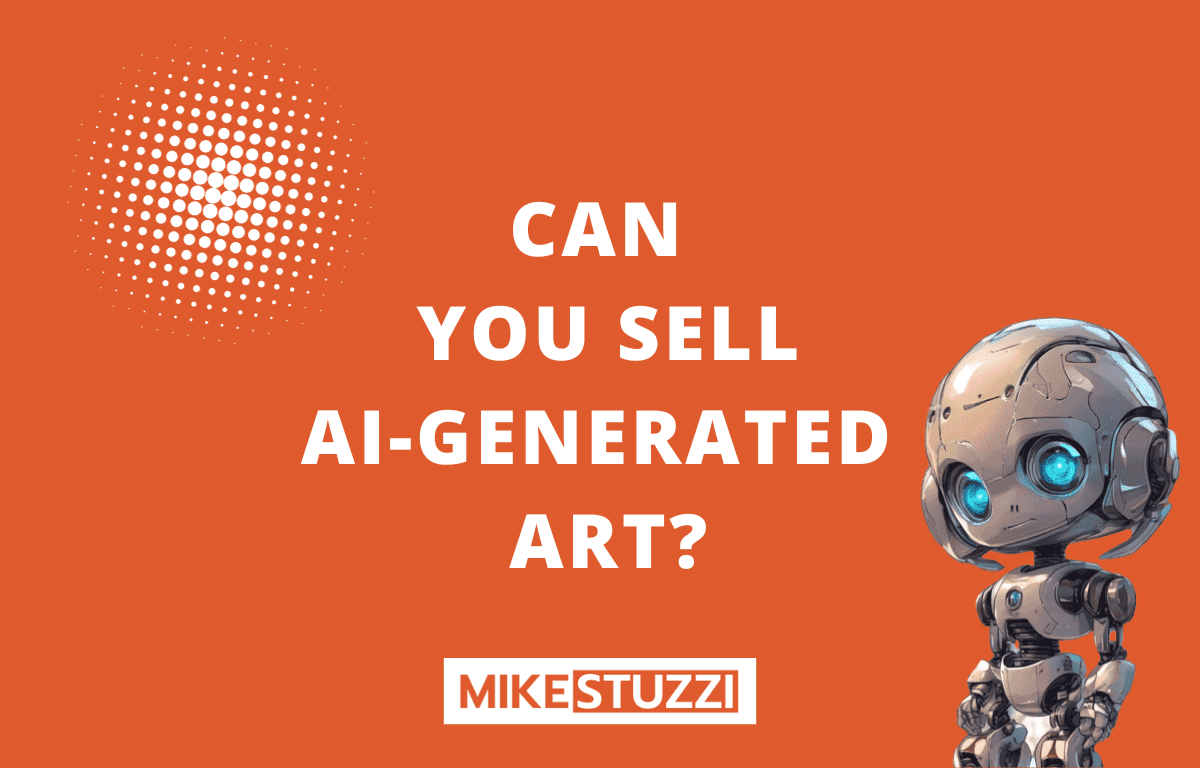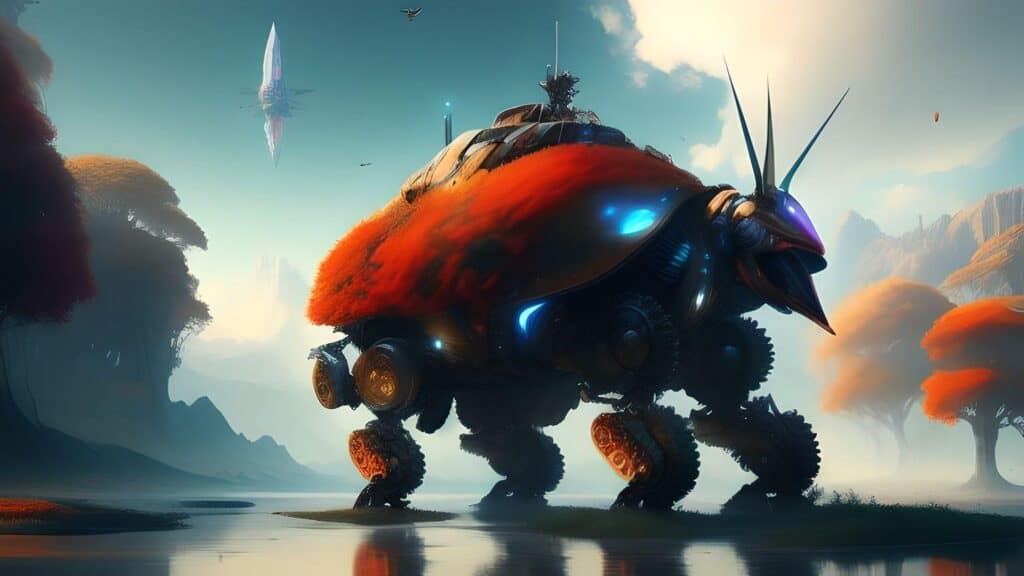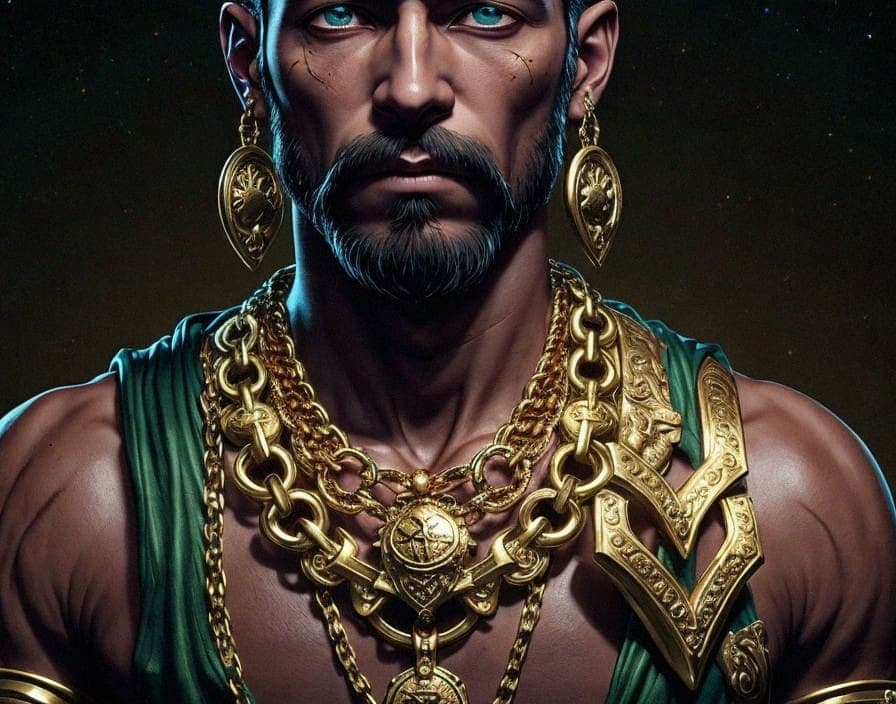Can You Sell AI-Generated Art? (Must Read)

Mike Stuzzi

Art has always reflected the human spirit, allowing people to convey their creativity and emotions. Artificial intelligence has emerged as a creative force that has shaken the world of media, including art. It begs the question, “Can you sell AI-generated art?”
You may have seen people publishing realistic AI art on social media and thought it to be a great opportunity to make some extra money. The thing about AI art is that with proper software and prompts, you can create almost any image from text instantly.
We've even seen that AI can produce realistic headshots of real or non-existent people. This is unlike human art or photography which requires skills and the investment of time and effort.
So, I did some research on whether you can sell AI art online and will share my findings in this article. We’re going to delve into the matter of AI-generated art and explore its legal implications, ethical considerations, challenges, and more.
What Is AI-Generated Art?

AI-generated art refers to artworks that are created with the assistance or complete involvement of artificial intelligence (AI) systems. These AI models are programmed to generate original artwork inspired by the datasets of existing art that they get trained on.
Through the training, an AI model learns patterns, styles, and techniques. When you describe to an AI art creation tool the kind of image you need, it’s able to use its acquired knowledge to produce a relevant output.
AI-generated art has gained popularity in recent years due to advancements in machine learning and AI technologies. It has sparked debates and discussions about the role of AI in the creative process, the definition of art, and its impact on the art industry.
Some view AI-generated art as a tool to enhance human creativity. However, others express concerns about losing human involvement and originality in the artistic process.
Is It Possible to Sell AI-Generated Art?
Let’s now answer your question of whether you can sell AI art.
Yes, it's possible to sell AI-generated art. In fact, AI-generated artworks have been sold at auctions and galleries for significant amounts of money.
For example, in 2018, an AI-generated artwork called "Portrait of Edmond de Belamy" was sold at Christie's auction house in New York for $432,500.
However, selling AI-generated art brings up some unique challenges and considerations. One of the main challenges is determining the ownership and copyright of the artwork.
Additionally, there may be concerns about the originality and authenticity of AI-generated art. Keep in mind that the algorithms ( given that they’re trained on existing artwork) may produce works that resemble or imitate established artists or inappropriately adopt elements of specific cultures around the globe.
And so, before you begin selling AI art, allow me to take you through the legalities and ethics surrounding it.

The Legalities Around AI Art
Let’s look at some of the legal matters concerning AI art.
Ownership and Authorship
The cornerstone of the legal framework surrounding AI-generated art is the question of ownership and authorship. Traditionally, copyright laws grant creators exclusive rights to their work.
But with AI, this becomes a little bit twisted. Who is the rightful owner of an artwork when the creative process heavily involves AI algorithms? Is it the user, the machine in use (or the developer who programmed and trained the AI), or shared ownership?
While these questions remain largely unresolved and vary by perspective, the conclusion most people come to is that you cannot copyright AI art from art creation platforms like Jasper Art or any other.
Anyone can use it for personal or commercial purposes. The reason is that other users of a specified tool may get similar or near-similar results upon using a text description or input like yours.
Also, according to this article by The Verge, the US copyright office doesn't allow an AI to copyright its art as it lacks "human authorship."
Trademarks and Patents
Beyond copyright, AI-generated art introduces challenges when it comes to trademarks and patents. If anyone can use your AI-generated logos, designs, or brand materials, it raises questions about trademark infringement.
Furthermore, AI-driven inventions, if patented, could alter the concept of intellectual property. This matter can result in disputes over the patentability of AI-generated innovations.
The Ethics of AI Art
The infiltration of AI into art creation brings with it several ethical considerations.
Transparency and Disclosure
One of the most important ethical questions is about the transparency and disclosure of AI involvement in one’s art creation. Should artists and creators be upfront about the extent to which they have used AI in their works?
The reason why this question is important is that failing to disclose AI's significant involvement in your art can lead to misrepresentation. People may think you did all the work yourself and even pay for your art.
But what if they realize later it's AI art? This could quickly turn into a legal battle you don’t want to be a part of.
Cultural Appropriation
Because generative AI algorithms get knowledge by accessing various images to produce output, they may unintentionally raise cultural appropriation concerns.
AI draws inspiration from diverse cultural sources. This means that there's a risk of appropriating cultural elements without proper understanding or respect.
Artists and AI programmers have to be mindful of this risk. If you use AI for art generation, there’s a need to incorporate cultural sensitivity into your creative processes.
What’s more, the question arises as to whether AI should be programmed to recognize and prevent cultural appropriation when creating images. And if so, who sets the guidelines for what constitutes appropriation?
Best Practices for Selling AI-Generated Art
Despite the challenges, there’s still a market for AI-generated art. And so, if you want to sell AI art, here are some tips for you:
- Understand the legal aspects of it: You need to familiarize yourself with copyright laws, intellectual property rights, and the legal implications of AI-generated art in your jurisdiction. For instance, the fact that you don’t “own” the AI art you create because there’s no copyright protection is worth knowing.
- Be transparent: It would help if you clearly disclose the role of AI in the creation process when marketing and selling AI-generated art. Feel free to provide information about the human input and creativity involved, such as programming, curation, and decision-making to avoid misinterpretation.
- Use AI art generation ethically: The best thing to do when it comes to AI-generated content is to avoid cultural appropriation by being culturally sensitive and respectful when depicting diverse cultures. You can develop and adhere to your own ethical guidelines for AI art creation that prioritize responsible usage.
- Have a marketing strategy: Anyone can create and sell AI art (really good AI art). You have to develop a unique selling proposition (USP) that highlights what sets your AI-generated art apart from other forms of art. Leverage digital platforms and social media to reach a broader audience and connect with potential buyers.
- Don’t sell AI art, but: Instead of selling AI art itself, an approach I would use myself to make money with AI art is selling it on other products. Some examples are clothing like t-shirts, accessories like phone cases, or lucrative digital products like e-books. In this case, you’re providing more value to the buyer.
Conclusion
So, you can sell AI art as you see fit. But to avoid being frowned upon for deception since most people can’t differentiate AI and human art, it would help to mention the tools you used in advance.
The best approach that I recommend is to use AI art as a complement to another product, such as custom clothes, accessories, or digital offerings. If you provide additional value (and not just selling AI art that anyone can now create without any special skills), more people may be willing to purchase from you.
So, go ahead and start selling AI art on Etsy, Amazon, Redbubble, eBay, or any other platform that embraces AI art!